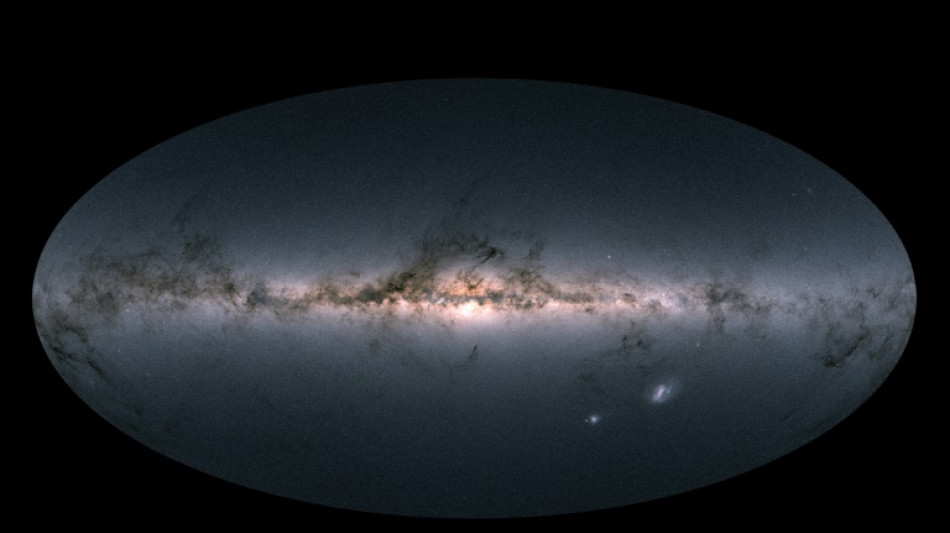
-
 Myanmar pro-military party claims Suu Kyi's seat in junta-run poll
Myanmar pro-military party claims Suu Kyi's seat in junta-run poll
-
Fed chair Powell says targeted by federal probe

-
 Trailblazing Milos Raonic retires from tennis
Trailblazing Milos Raonic retires from tennis
-
Australia recalls parliament early to pass hate speech, gun laws

-
 'One Battle After Another,' 'Hamnet' triumph at Golden Globes
'One Battle After Another,' 'Hamnet' triumph at Golden Globes
-
Japan aims to dig deep-sea rare earths to reduce China dependence

-
 Top UN court to hear Rohingya genocide case against Myanmar
Top UN court to hear Rohingya genocide case against Myanmar
-
US sends more agents to Minneapolis despite furor over woman's killing

-
 Trump says Iran 'want to negotiate' after reports of hundreds killed in protests
Trump says Iran 'want to negotiate' after reports of hundreds killed in protests
-
Bangladesh's powerful Islamists prepare for elections

-
 NBA-best Thunder beat the Heat as T-Wolves edge Spurs
NBA-best Thunder beat the Heat as T-Wolves edge Spurs
-
Ukraine's Kostyuk defends 'conscious choice' to speak out about war

-
 Trump says working well with Venezuela's new leaders, open to meeting
Trump says working well with Venezuela's new leaders, open to meeting
-
Asian equities edge up, dollar slides as US Fed Reserve subpoenaed

-
 Hong Kong court hears sentencing arguments for Jimmy Lai
Hong Kong court hears sentencing arguments for Jimmy Lai
-
Powell says Federal Reserve subpoenaed by US Justice Department

-
 Chalamet, 'One Battle' among winners at Golden Globes
Chalamet, 'One Battle' among winners at Golden Globes
-
Turning point? Canada's tumultuous relationship with China

-
 Eagles stunned by depleted 49ers, Allen leads Bills fightback
Eagles stunned by depleted 49ers, Allen leads Bills fightback
-
Globes red carpet: chic black, naked dresses and a bit of politics

-
 Maduro's fall raises Venezuelans' hopes for economic bounty
Maduro's fall raises Venezuelans' hopes for economic bounty
-
Golden Globes kick off with 'One Battle' among favorites

-
 Australian Open 'underdog' Medvedev says he will be hard to beat
Australian Open 'underdog' Medvedev says he will be hard to beat
-
In-form Bencic back in top 10 for first time since having baby

-
 Swiatek insists 'everything is fine' after back-to-back defeats
Swiatek insists 'everything is fine' after back-to-back defeats
-
Wildfires spread to 15,000 hectares in Argentine Patagonia

-
 Napoli stay in touch with leaders Inter thanks to talisman McTominay
Napoli stay in touch with leaders Inter thanks to talisman McTominay
-
Meta urges Australia to change teen social media ban

-
 Venezuelans await political prisoners' release after government vow
Venezuelans await political prisoners' release after government vow
-
Lens continue winning streak, Endrick opens Lyon account in French Cup

-
 McTominay double gives Napoli precious point at Serie A leaders Inter
McTominay double gives Napoli precious point at Serie A leaders Inter
-
Trump admin sends more agents to Minneapolis despite furor over woman's killing

-
 Allen magic leads Bills past Jaguars in playoff thriller
Allen magic leads Bills past Jaguars in playoff thriller
-
Barca edge Real Madrid in thrilling Spanish Super Cup final

-
 Malinin spearheads US Olympic figure skating challenge
Malinin spearheads US Olympic figure skating challenge
-
Malinin spearheads US figure Olympic figure skating challenge

-
 Iran rights group warns of 'mass killing', govt calls counter-protests
Iran rights group warns of 'mass killing', govt calls counter-protests
-
'Fragile' Man Utd hit new low with FA Cup exit

-
 Iran rights group warns of 'mass killing' of protesters
Iran rights group warns of 'mass killing' of protesters
-
Demonstrators in London, Paris, Istanbul back Iran protests

-
 Olise sparkles as Bayern fire eight past Wolfsburg
Olise sparkles as Bayern fire eight past Wolfsburg
-
Man Utd knocked out of FA Cup by Brighton, Martinelli hits hat-trick for Arsenal

-
 Troubled Man Utd crash out of FA Cup against Brighton
Troubled Man Utd crash out of FA Cup against Brighton
-
Danish PM says Greenland showdown at 'decisive moment' after new Trump threats

-
 AC Milan snatch late draw at Fiorentina as title rivals Inter face Napoli
AC Milan snatch late draw at Fiorentina as title rivals Inter face Napoli
-
Venezuelans demand political prisoners' release, Maduro 'doing well'

-
 'Avatar: Fire and Ashe' leads in N.America for fourth week
'Avatar: Fire and Ashe' leads in N.America for fourth week
-
Bordeaux-Begles rout Northampton in Champions Cup final rematch

-
 NHL players will compete at Olympics, says international ice hockey chief
NHL players will compete at Olympics, says international ice hockey chief
-
Kohli surpasses Sangakkara as second-highest scorer in international cricket


Milky Way's secrets revealed by massive space probe map
The Gaia space probe unveiled its latest discoveries on Monday in its quest to map the Milky Way in unprecedented detail, surveying nearly two million stars and revealing mysterious "starquakes" which sweep across the fiery giants like vast tsunamis.
The mission's third data set, which will be released to eagerly waiting astronomers around the world at 1000 GMT, "revolutionises our understanding of the galaxy," the European Space Agency (ESA) said.
"It's the Swiss Army knife of astrophysics -- there is not a single astronomer who does not use its data, directly or indirectly," said Francois Mignard, a member of the Gaia team.
Some of the map's new insights are close to home, such as a catalogue of more than 156,000 asteroids in our Solar System "whose orbits the instrument has calculated with incomparable precision," Mignard said.
But Gaia also sees beyond the Milky Way, spotting 2.9 million other galaxies as well as 1.9 million quasars -- the stunningly bright hearts of galaxies powered by supermassive black holes.
The Gaia spacecraft is nestled in a strategically positioned orbit 1.5 million kilometres (937,000 miles) from Earth, where it has been watching the skies since it was launched by the ESA in 2013.
- 'Beautiful melting pot of stars' -
"Gaia scans the sky and picks up everything it sees," said astronomer Misha Haywood of the Paris Observatory.
But it can still only detect around one percent of the stars in the Milky Way, which is about 100,000 light years across.
The probe is equipped with two telescopes as well as a billion-pixel camera, which captures images sharp enough to gauge the diameter of a human hair at a distance of 1,000 kilometres (620 miles).
It also has a range of other instruments that allow it to not just map the stars, but measure their movements, chemical compositions and ages.
"It provides a global observation of the positions of anything that moves in the sky, for the first time," Haywood said, adding that before Gaia "we had a really restricted view of the galaxy".
It also reveals the huge array of differences between stars.
"Our galaxy is a beautiful melting pot of stars," said Gaia member Alejandra Recio-Blanco.
"This diversity is extremely important, because it tells us the story of our galaxy's formation," he said.
"It also clearly shows that our Sun, and we, all belong to an ever-changing system, formed thanks to the assembly of stars and gas of different origins."
- Surprise starquakes -
The observation of "starquakes", massive vibrations that change the shape of the distant stars, was "one of the most surprising discoveries coming out of the new data", the ESA said.
Gaia was not built to observe starquakes but still detected the strange phenomenon on thousands of stars, including some that should not have any -- at least according to our current understanding of the universe.
"Gaia is opening a gold mine for 'asteroseismology' of massive stars," said Gaia member Conny Aerts.
Around 50 scientific papers were published alongside the new data, with many more expected in the coming years. Gaia's observations have fuelled thousands of studies since its first dataset was released in 2016.
The second dataset in 2018 allowed astronomers to show that the Milky Way merged with another galaxy in a violent collision around 10 billion years ago.
The torrent of raw data is combed through by a team of 450 European scientists and software engineers using six supercomputers as well as "human-driven algorithms" as part of the Data Processing and Analysis Consortium, Mignard said.
"Without this processing group, there is no mission," he added, because every day Gaia produces 700 million star positions and 150 million photometric measurements.
It took the team five years to deliver the latest data, which was observed from 2014 to 2017.
"We can't wait for the astronomy community to dive into our new data to find out even more about our galaxy and its surroundings than we could've imagined," ESA's Gaia project scientist Timo Prusti said.
The final data set will be released in 2030, after Gaia finishes its mission surveying the skies in 2025.
H.Darwish--SF-PST




